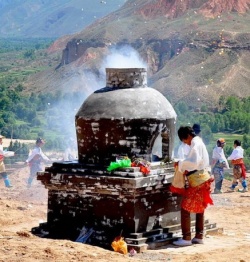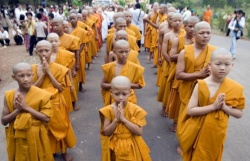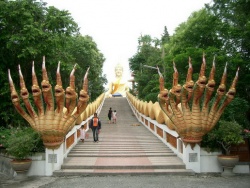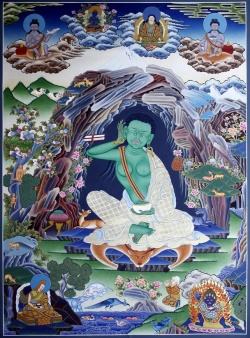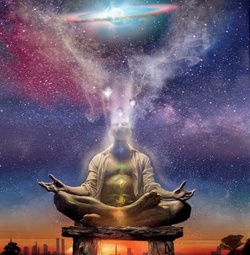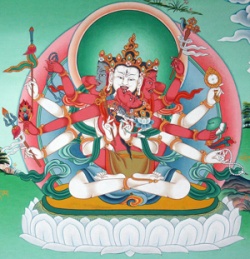Tibetan Buddhist Lineage in the West
Episode Description:
Reginald Ray, Tibetan Buddhist scholar and teacher, is backhitw us this week to discuss some pretty big topics. We explore the break that he made, several years ago with the Shambhala tradition, and the larger implications of becoming a Western teacher in the Tibetan Buddhist tradition. Connected with that we explore the whole issue of Westerners not being regularly empowered to be teachers, and several of the factors involved in that dynamic. We also touch on whether or not Westeners make the best practitioners, and what seems to keep them from going deep.
This is part 2 of a two-part series. Listen to part 1, The Forest Dwelling Yogi.
Episode Links:
Dharma Ocean
Your Breathing Body – Vol 1.
Your Breathing Body – Vol 2.
Touching Enlightenment
Transcript:
Reginald: One of the issues, also, with Tibetan Buddhism, which I think we all have to deal with as practitioners and as teachers, is the tendency we all have to spiritual bypassing. Which is a term invented by, or coined by John Welwood, who’s a very gifted psychologist, and has written a lot about spirituality and psychology. And spiritual bypassing is that, because we have the misconception in our modern world that spirituality is a matter of separating ourselves from the gritty, ordinary reality of our own day to day lives, we tend to use even Tibetan Buddhism in the service of further disembodiment.
So we use our Tibetan practices to try to enter some sort of ideal world, rather than to re-embody. So, this is something we all face, and it’s something that’s very much a reality in our world. I live in Crestone, Colorado, as you know, where we have a retreat center there, and there are a number of wonderful somatic practitioners there, rolfer that I know and work with, and some acupuncturist and some other people. And they have told me that people who practice Tibetan Buddhism, of which there are many in our world now, many in Crestone, and they were putting this to me as a challenge, when I first met them, practitioners of Tibetan Buddhism are among the most disembodied people they’ve ever met. [Laughter]
I was stunned, because from my point of view, the whole point of Tibetan Buddhism, as you’re saying, is to re-embody, and to experience the sacredness of what it means to be human. And, so, I found that very, very interesting, and I have been thinking about it ever since.
Ryan: Very Ironic.
Reginald: Yeah.
Ryan: So, and I don’t remember exactly how far back, but in last few years, kind of recent, you started your own retreat center and when I was thinking about this question, it’s kind of funny using words because using “start,” “new,” would automatically ignore where your roots are, and Trungpa Rinpoche’s teachings. But, in terms of the western context, you differentiated from the Shambhala center, which is another group that’s dedicated to Trungpa Rinpoche’s teachings. So, it’s just an interesting topic in general to speak with you about, what does that mean for you? What does that look like in terms of starting a new direction? A new lineage almost, right?
Reginald: Well, the way I view it is, and I’ll put it in sort of maybe “start” terms, then we can talk about it. From my point of view, I have simply continued what I learned from my teacher. And the community I was part of took a different direction, and began doing other things. And I think you’ll find, if you talk to Trungpa Rinpoche’s students, I don’t think anybody would argue with that point.
But what is different, I think about me, and also some other people who’ve done the same thing, and by the way, there are increasing numbers of his older students who are starting to do exactly what I’m doing, which is teach what they learned from him. What is different, is that many people who studied with Trungpa Rinpoche, when his son came into power and began doing things differently, they changed their direction. And I have no problem with that, I think that’s certainly a personal choice and something they felt that they want to continue to be part of the same organization and wanted to really explore the new directions that were happening.
But some people were not comfortable with that, and my sense from Trungpa Rinponche, and I was a very fortunate person in a way, because I was one of the people who met him immediately when he came to this country, and worked with him in the early years, where frankly the transmission, in my opinion, was the most powerful. The first few years he was here, from 1970 through maybe 1976. My experience of him was so indelibly imprinted, not just on my soul, but in my body and in my cells, that when the community began going in a different direction, it was choiceless for me to continue teaching his teaching.
And the sequence of development really was as people were asked to change their teaching, you know the senior teachers were asked to begin teaching other things, and begin teaching in other ways, I found myself incapable of doing it. So for, actually, quite a number of years, at the shambhala mountain center, where I was teacher in residence, I kept teaching his teaching. And at a certain point it became really inelegant for me to continue there because it was difficult for everybody else. I mean, here’s this person who, from their viewpoint, I was hanging on to the past and why wasn’t I willing to make the changes that the institution was requiring. Although nobody said, “Why don’t you go someplace else,” it just really became, I felt, impolite really, to continue doing it in that context and confusing everybody else. Mean time, half the staff were students of mine, and were doing it…you know, following Trungpa Rinpoche’s teachings.
So, at a certain point I just decided, maybe it’s time for me to actually admit the fact that what I’m doing is different and that in being in line with Trungpa Rinpoche’s teaching is different from what’s going on now, maybe I should just go someplace else, and at that time I had about a hundred students and they were all clamoring to…you know, “what’s wrong with you, why don’t we start our own center?” and I finally gave in.
Ryan: So you had a lot of motivation from your students.
Reginald: I had a huge amount, and in particular, they wanted to receive Vajrayana teaching from me, and up until I left the Shambhala mountain center, I was unwilling to do it. Just because the organization had put in place rules, whereby Trungpa Rinpoche’s senior students were not allowed, really, to give transmission, and were not really allowed to mentor students, as their primary students. So, my students, I admit it, it was their inspiration and I wonder sometimes, where was I? I mean, why didn’t I get this figured out earlier, but I didn’t, and finally the pressure build up and we left, we went to Crestone over four years ago and its been bombs away. [Laughter]
Ryan: You know, it’s interesting, as we’ve interviewed people from different traditions, I’ve just noticed quite a bit of difference between the Tibetan Buddhist tradition and the other traditions. We’ve spoken with plenty of Insight teachers and Zen teachers, who’ve done just what you’ve done. It’s actually feeling more and more common to me. Like it’s not a big deal.
Reginald: It’s not a big deal.
Ryan: And, talking with you, it’s not a big deal for me, like everything you said. It makes perfect sense that you’ve done what you’ve done.
Reginald: Yeah.
Ryan: But there seems to be a charge around it for a lot of other people, or if they don’t know about your situation, if you talk to them about a hypothetical situation; in the Tibet tradition it would get a charge. But in other traditions, it’s not. So, I’m like, what’s the difference here? And why isn’t this happening more often, if it’s happening in other traditions it would make sense to happen in the Tibetan tradition, so, why isn’t it happening?
Reginald: This is a very good question and I don’t know if you know who Diana Eck is? She’s a wonderful scholar of Hinduism, and was here a few years ago, and asked me that very question. She said, “you’re a scholar,” this is before I started teaching dharma, and she said: “you’re a scholar and it’s weird, in the Tibetan tradition, all you white people are scholars, but nobody is allowed to be a teacher, what’s the deal?”
Ryan: Yeah.
Reginald: And it’s strange enough I hadn’t thought of that question but after she asked me I did think about it a lot. And there are a couple things here: the first thing is, even within Tibetan tradition, the rule is that you study with a great teacher, and you practice and you continue studying after his death…his or her death…only in Tibetan Buddhism its usually his. And after a certain point, you are required, in order for your own development and for the spread of the dharma, to go out and take your own students and begin teaching, in the same way that your teacher did. I mean it’s just how it’s done.
Ryan: Right.
Reginald: So, then we can ask, what about the other traditions? And it’s the same there, if you look Theravada Buddhism it’s that way, if you look at Zen Buddhism it’s that way. So, again, we come back to your question, why isn’t it happening with Tibetan Buddhism? You know, these are touchy issues and I’m just giving my opinion…
Ryan: sure.
Reginald: and other people would say other things. But I think, there are two items here: one is, among all of the Buddhist traditions, I think the most conservative is Tibetan Buddhism. And this is because of the conservatism and the isolation of Tibetan culture itself. I mean Tibetan culture really cut itself off from the rest of Asia, in order to try to preserve itself in the face of these huge cultures. India to the south, China, Russia, but it also affected Buddhism, where Buddhism became very, very conservative and there was a tremendous emphasis on not changing anything. And doing everything the way it was done in the past.
And part of that whole world is that, foreign people, that the Tibetans have a kind of unique possession of the dharma. And even though there are many Tibetans who do not feel that way, nevertheless, that’s the main stream of attitudes within traditional Tibetan Buddhism. So one issue is that one: are Tibetans really willing, and do they feel capable and able to fully transfer their traditions to people who are different? There are some westerners, who are now empowered by Tibetans, but these are people who have learned Tibetan, they dress in Tibetan clothes, they sit on the high thrones, they require their students to do prostrations. I mean it’s almost as if they become Tibetans.
Ryan: Yeah.
Reginald: But for Western teachers, who are not doing that, to be fully empowered, simply based on their own understanding, their practice and their realization, would be such a stretch for what Tibetan tradition is used to. So, that’s one issue.
Ryan: Yeah.
Reginald: And Trungpa Rinpoche said that one of his problems with Tibetan culture was that Tibetans tend to look down on other people, and when he was in—and I’m not saying this is true of the whole culture—but this is something that he mentioned. When he was in England and he started teaching westerners, that’s why he was thrown out of his monastery, because the other Tibetans there really felt and told him so, that they felt westerners can’t understand the dharma, and you shouldn’t be teaching them the highest teachings, and they really are lay people, and we should keep this within the family fold.
So I think that’s an important issue. And the other thing is, frankly, that Tibetans are in a very, very difficult position now as refugees, and really they’re tying to preserve their culture, and rightly so, they should try to preserve their culture. But part of preserving their culture, is preserving Tibetan Buddhism in its traditional form. And I think there’s some hesitation there that if western people are empowered, fully empowered, to carry on the traditions that it may end up eroding what they’re trying to do, in preserving the culture and the tradition. So there are a lot of forces at stake here, but one sort of countervailing tendency is that Trungpa Rinpoche himself told me and told many other students, in the early days: “my expectation is, I’m training you like tulkus, I’m not training you like lay people, and my expectation is, each one of you will continue to study, will do the practice, will attain some understanding, and will go out and train your own students.”
And his Dharma heir, the Vajra regent, with all of his mixed history and all of the pain around his life and death, told me the same thing, and basically said to me, in 1974: who are your students? And I said what are you talking about? And he said, you should be planning to become a teacher in your own right, and who are they, who are you working with? And this is what we’re doing; this is what we’re about. So, this was Trungpa Rinpoche’s approach and in some sense it did set him apart from a lot of the other teachers, a lot of the other Tibetan teachers.
Ryan: Thank you, that was wonderful. A lot of things I haven’t thought about.
Vince: Yeah, I have a kind of follow up question, which, when you we’re speaking, I was wondering, what impression westerners might get from that, in terms of how possible is it to actually achieve, what the practices are about, if there aren’t other westerners, a lot of other westerners who are being empowered to teach, is it possible that it has a disempowering impact on some practitioners? Were they’re like, oh I don’t see anyone else, I don’t see any other of my cultural peers who are empowered to teach this stuff. So they must not have realized anything. Is that possible?
Reginald: Well it is possible, and one thing, you bring up a very important issue, which is another reason I think the Tibetans are hesitant to empower westerners, which is that westerners are, I don’t know how to put this in a way that doesn’t sound too negative, but since I’ve been giving transmission and teaching Vajrayana and teaching students at all levels, including the most advanced levels, which has been going on now for a number of years. I have been befriended by quite a number of the younger Tibetan tulkus, and their basic message to me, strangely enough, has been: Thank you, thank you for stepping forward, thank you for continuing Trungpa Rinpoche’s teaching because it needs to happen, it needs to be continued in the way that he taught it.
And we talk further, and we talk about these issues of why aren’t more westerners actually being empowered. And one of the things that they have told me, and I think it’s really true, is westerners are not always the best practitioners, and many times there’s a tremendous amount of enthusiasm at the beginning, when they meet a Tibetan teacher and they begin doing practices, but several of these friends of mine, and I’m not going to mention their names because they’ll get emails [laughter], but several of them have said to me, one in particular who I’m very close to, he’s very sad, because he feels that, he told me recently, we were having some drinks together, and as usual reticence kind of fell away, and he said he felt very sad because he didn’t know if Tibetan Buddhism was going to make it in the modern world.
Not in the…of course the tradition will keep going, and the very traditional way of teaching it will, but he said, that isn’t what Buddhism is supposed to be and that’s not what the Vajrayana is supposed to be, it needs to come into the modern world in a modern way, and we need the western people to do that. And he said he was very sad because many of the people he works with, initially there’s this enthusiasm, and then they just can’t keep it up. And they stop doing retreats, and they’ll do a little bit of daily practice.
And so that’s another, I think, very legitimate hesitation on the part of the Tibetan teachers, is that, frankly, we in the west have trouble sticking with things, and the kind of sustained practice over decades, which is necessary to really achieve some realization. Most people are either unable or their not quite into it.
Vince: And that brings up a whole host of questions, which, will the broad one is why? But then, because I’m thinking, there are plenty of other areas in our culture, where people put in the kind of time and effort that’s equivalent, like getting a PhD for instance, its just years and years and years of intensive training and study and then going on to be a scholar, and continuing that. So, I’m just wondering why you think it is that westerners, just in general, as dedicated or committed practitioners?
Reginald: Well we could ask, in the monasteries of India, the Tibetan monasteries where Tibetan tulkus are being trained, they aren’t either. It’s very difficult to keep them engaged. And a lot of them are wandering off and doing other things, they get their training, and then they go do other things. They don’t want to carry it on, and we can ask why in that case also.
And I think we live in a world where immediate gratification, I mean, I know it sounds trite to say it, but we can always find some pleasure, somewhere. And the thing about practice is, it’s very much like learning a musical instrument or anything that requires a tremendous amount of discipline, there are not that many people willing to do it. And the other issue is that there’s no cultural payoff.
Vince: Right, right.
Reginald: There’s no payoff, I mean, somebody can practice their whole life and nobody cares.
Vince: [laughter]
Reginald: and nobody in the culture says anything, I mean, who cares?
Ryan: they’re still a dishwasher at a local restaurant.
Reginald: yeah, exactly. Now, from my point of view that guarantees the integrity of the practice. When I find people who are really serious about it, and really are turned on by the kind of depth of experience and transformation that occurs, and are willing to stick with it; that guarantees the integrity. So, it’s not necessarily a bad thing, but it really limits the number of people who are willing to do it.
Vince: right.
Reginald: And the Tibetans see that and they’re hesitant. They don’t want to hand their teachings over to people who are not going to take them seriously enough.
Vince: yeah, I’ve heard figures from Allan Wallace, like many of the Tibetan yogis spend fifty, sixty thousand hours meditating in the course of a lifetime. I mean, most of the positive psychology research says that 10,000 hours, minimum to master a particular skill or technique. And it does seem like they’re not. One, there isn’t the payoff to do that, it’s not like we can make a good livelihood, necessarily, if we put that kind of time and energy in. And two, like you’re saying, there’s not a lot of people doing that [Laughs].
Reginald: Yeah, but think about it, this is one of the things I figure out in retreat, like how many hours have I meditated, I don’t know, it’s just like you try to think of anything to keep your mind busy, right?
Vince: Sure.
Reginald: And if you’re willing to do, over a ten year period, if you’re willing to do daily practice, of say an hour or two; retreat, maybe a month or two months a year; you can do 10,000 hours of meditation every ten years.
Vince: right.
Reginald: and thirty of forty years, that 30 or 40,000 hours of meditation, and I tell my students, I absolutely guarantee you that everything is going to change many, many, many times over that period of time. And you will come into a way of living your life that fulfills a million times over anything you can get from getting a PhD, or being wealthy, or whatever it may be. Now, the problem is many people don’t believe me. I have a hard time getting people to believe me, but I mean, that’s the deal, I mean it’s there, it’s offered.
The Buddha said: The greatest joy in life comes from practice. But I think we as westerners kind of don’t quite believe it because we’ve heard that from everybody, that this is how you can be happy, and so we become cynical, and we kind of just try to be happy, day in and day out, without doing the long term thing.
Vince: Here’s a kind of blunt question [laughs].
Reginald: Sure.
Vince: So, for instance in the Theravada tradition, there are maps that describe some of the ways that things tend to progress, though there are a lot of individual differences…
Reginald: Can I tell you something funny?
Vince: Yes.
Reginald: before we go on.
Vince: Sure.
Reginald: A Tibetan forest monk of great attainment, came, I have some students in Thailand, some Thai students who are teaching my teachings in Thailand.
Vince: Oh yeah, yeah.
Reginald: One of my students brought this meditator to meet me in Crestone. And it was wonderful, I mean we were flying in the same sky.
Vince: Yeah.
Reginald: But he started in on the map thing, and he wanted to know, he started asking me all these questions to try to figure out where I was on his map. I find that ridiculous!
Vince: Well, that’s not where I’m going with this it…
Reginald: no, I know you’re not, but I just had to mention that [laughs].
Vince: Sure, sure. That’s a whole other interesting thing, is the maps within the traditions, but I’m more laying it out as a way to ask a question…
Reginald: Sure.
Vince: which is, often times, and you’ve talked about his yourself, one of the recent audio programs I was listening to you describe this, where there’s initial, kind of, difficult period of practice, call it the dark night. And in Theravada they call it the rolling up of the mat stage, it’s the period were people are just like: I’m done with this, I don’t see why I should keep going; it’s not pleasant, it’s not clear anymore. I’m wondering how much of westerners lack of, like you said, the initial enthusiasm, it doesn’t take long to get to this point. How much of people’s kind of burning out is related to these kind of initial periods of practice, which can often be very difficult, and without the proper guidance and the proper view, of like, oh this is part of the path, can people just fizzle out, that just seems to be, from what I can see, a big part of it. But I’m wondering from a teacher perspective, you must deal with that kind of thing on a daily basis.
Reginald: Well, I would agree with that, I think that the, yeah there is this…it’s very, very true, in the beginning people often are really seeing their own obstacles, and seeing how monumental the journey seems and yeah they’ll often turn away. But another very important thing that happens, you know within the Tibetan tradition we have this thing called pointing-out, and I think we have this, also Theravada Buddhism has its own version of that, and so does Zen, but in working with the body you can, I can, people can bring a practitioner into an experience of their own unborn mind, their own natural state, their own freedom, fairly quickly. And often that’s where the enthusiasm rises from, they realize, wow that’s it, I have this within my experience, and this is accessible.
And when I, as I was saying, when I view my life from that point of view it’s entirely different. But then the expectation is that they can just live in that state.
Vince: Just hang out there [laughs]. It’s done.
Reginald: Yeah, it’s done; I’m finished. But what they’re not prepared to for, and this is again, we have this whole issue of the difficulty western people have to relate to relative reality as sacred. What happens is, the deeper you go in your own fundamental freedom, the deeper you stir up your obstacles, and the process of the path is, you go deep and you open and you experience a huge amount of joy and liberation, and that very state generates further depths of confusion, and paranoia, and fear.
And those rise to the surface, and they take you over, as a practitioner, and you have to be a very stable person, and willing to endure that. And when people figure that out, that it’s not just about hanging out in some blissful space, but it’s actually cycles between that blissful space and hard work, often thats when they check out because they go: I don’t really need to experience this level of my own misery and confusion. They just don’t want to do it.
Vince: Cool, thank you.
Reginald: Yeah.
Source
http://www.buddhistgeeks.com/2009/01/bg-106-tibetan-buddhist-lineage-in-the-west/
